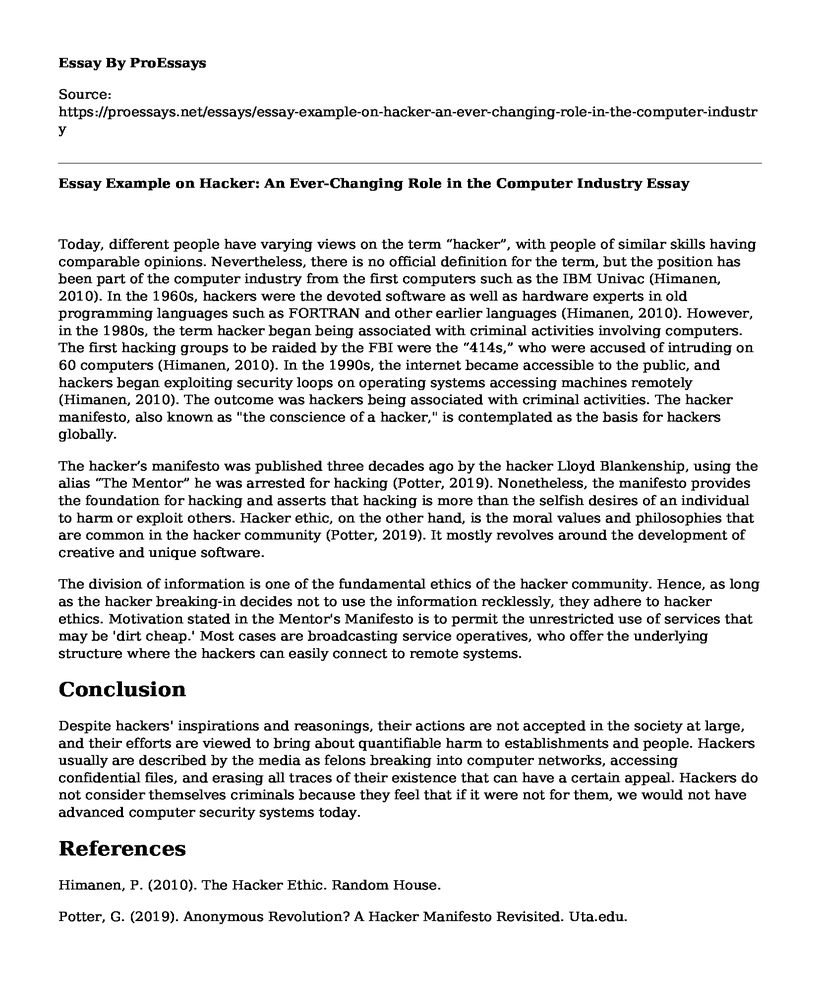Today, different people have varying views on the term “hacker”, with people of similar skills having comparable opinions. Nevertheless, there is no official definition for the term, but the position has been part of the computer industry from the first computers such as the IBM Univac (Himanen, 2010). In the 1960s, hackers were the devoted software as well as hardware experts in old programming languages such as FORTRAN and other earlier languages (Himanen, 2010). However, in the 1980s, the term hacker began being associated with criminal activities involving computers. The first hacking groups to be raided by the FBI were the “414s,” who were accused of intruding on 60 computers (Himanen, 2010). In the 1990s, the internet became accessible to the public, and hackers began exploiting security loops on operating systems accessing machines remotely (Himanen, 2010). The outcome was hackers being associated with criminal activities. The hacker manifesto, also known as "the conscience of a hacker," is contemplated as the basis for hackers globally.
The hacker’s manifesto was published three decades ago by the hacker Lloyd Blankenship, using the alias “The Mentor” he was arrested for hacking (Potter, 2019). Nonetheless, the manifesto provides the foundation for hacking and asserts that hacking is more than the selfish desires of an individual to harm or exploit others. Hacker ethic, on the other hand, is the moral values and philosophies that are common in the hacker community (Potter, 2019). It mostly revolves around the development of creative and unique software.
The division of information is one of the fundamental ethics of the hacker community. Hence, as long as the hacker breaking-in decides not to use the information recklessly, they adhere to hacker ethics. Motivation stated in the Mentor's Manifesto is to permit the unrestricted use of services that may be 'dirt cheap.' Most cases are broadcasting service operatives, who offer the underlying structure where the hackers can easily connect to remote systems.
Conclusion
Despite hackers' inspirations and reasonings, their actions are not accepted in the society at large, and their efforts are viewed to bring about quantifiable harm to establishments and people. Hackers usually are described by the media as felons breaking into computer networks, accessing confidential files, and erasing all traces of their existence that can have a certain appeal. Hackers do not consider themselves criminals because they feel that if it were not for them, we would not have advanced computer security systems today.
References
Himanen, P. (2010). The Hacker Ethic. Random House.
Potter, G. (2019). Anonymous Revolution? A Hacker Manifesto Revisited. Uta.edu. https://www.uta.edu/huma/agger/fastcapitalism/11_1/potter11_1.html
Cite this page
Essay Example on Hacker: An Ever-Changing Role in the Computer Industry. (2023, Sep 01). Retrieved from https://proessays.net/essays/essay-example-on-hacker-an-ever-changing-role-in-the-computer-industry
If you are the original author of this essay and no longer wish to have it published on the ProEssays website, please click below to request its removal:
- Scanning and Enumeration Research
- Investigating the Magnetic Field of a Coil Using a Smartphone
- Assignment Example on Google Company
- IT Security Risk Assessment Essay Example
- Articles Analysis Essay on Computer Networking
- Virtual Communities Research Paper Example
- HCA Health Care: Overcoming Data Challenges With Tech Trends - Essay Sample







